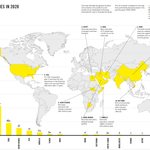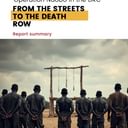
Fewer executions were carried out across the world in 2020 than at any time in a decade and new death sentences fell by more than a third, according to a new report by Amnesty International. It was the third consecutive year in which confirmed executions reached a 10-year low, and the sixth year in a row in which confirmed executions declined, Amnesty said.
The human rights organization’s report, Global Report: Death Sentences and Executions 2020, released April 21, 2021, said that Amnesty had recorded 483 executions in 18 countries in 2020, down 26.5% from the 657 confirmed executions carried out in 20 countries in 2019. Confirmed executions were 70.6% below the 1,634 executions recorded in 2015.
While executions declined in most of the world, they more than tripled in Egypt from at least 32 in 2019 to at least 107 last year. Executions decreased 85.3% in Saudi Arabia, falling from 184 to 27. They fell by more than half in Iraq, from 100 to 45. The United States carried out 17 executions in 2020, the sixth most of any nation, behind China (estimated in the thousands), Iran (246+), Egypt (107+), Iraq (45+) and Saudi Arabia (27). The U.S. was once again the only country in the Western hemisphere to carry out executions.
China, North Korea, and Vietnam consider executions and death sentences to be state secrets and prevent accurate independent monitoring. As a result, they are not included in Amnesty International’s figures for confirmed executions and death sentences.

Criticisms of United States Human Rights Violations
Amnesty criticized Egypt, China, and the U.S. federal government for accelerating executions during the pandemic. “Against the backdrop of a world paralyzed by the pandemic, the disturbing determination of officials in some countries to circumvent health measures and relentlessly pursue executions and death sentences added an additional layer of cruelty to their use of the death penalty and made the case for its abolition ever more urgent,” the report said.
Restriction on access to in-person legal representation and the “absolutely avoidable” health risks caused by “pursuing executions in the middle of a pandemic” made the use of the death penalty “a particularly egregious assault on human rights,” Amnesty International Secretary General Agnès Callamard said.
Callamard also criticized the conduct of U.S. federal officials during the government’s 2020 execution spree. In a commentary in TIME magazine, she wrote that the U.S. had “severely curtailed prisoners’ ability to seek help” to redress inadequate legal representation and other trial and appellate defects that violated international law. “In several cases in the U.S.,” she wrote, “federal authorities executed people by lethal injection after the original death warrant had expired, even though motions were still pending before the courts.” This, she said, violated “the critical safeguard under international law requiring states not to proceed with execution if appeals are pending.”
Declining Death Sentences and Support for the Death Penalty Worldwide
Fifty-four countries imposed death sentences in 2020, according to the global report, two fewer than in 2019. Amnesty confirmed that at least 1,477 death sentences were imposed worldwide, down 35.9% from the 2,307 confirmed death sentences imposed in 2019. Amnesty attributed part of the decline to “disruptions and delays in criminal proceedings across the world” caused by the COVID-19 pandemic. However, the report cautioned that “[v]ariations in the nature and availability of information on death sentences for some countries continued to affect [its] assessment and ability to accurately compare trends by country.” At least 20 countries imposed more death sentences than the United States did in 2020, and given the absence of information from which to confirm death sentences in some countries, the number is likely higher.
Globally, Amnesty International reported that at least 28,567 people were known to be under sentence of death. Nine countries had confirmed death rows of more than one thousand prisoners: Iraq (7.900+), Pakistan (4,000+), Nigeria (2,700+), USA (2,485), Bangladesh (1,800+), Malaysia (1,314+), Vietnam (1,200+), Kenya (1,000+), Sri Lanka (1,000+). However, data was not available to estimate the size of large death rows in China, Egypt, Iran, North Korea, and Saudi Arabia.
Amnesty reported that several more countries moved towards death penalty abolition in 2020, with Chad abolishing the death penalty for all crimes and Kazakhstan signing the Second Optional Protocol to the International Covenant on Civil and Political Rights, aiming at the abolition of the death penalty. The report noted that Colorado became the 22nd U.S. state to abolish capital punishment, Barbados repealed its law that had provided for mandatory death sentences, and Sudan abolished the use of the death penalty for apostasy. Saudi Arabia issued a statement saying it would reduce its use of the death penalty against people charged with offenses committed when they were younger than age 18.
In December 2020, a record 123 nations in the United Nations General Assembly voted in favor of a resolution calling for a worldwide moratorium on executions. At the end of the year, Amnesty said, 108 of the world’s countries had abolished the death penalty in law for all crimes and 144 countries had abolished the death penalty in law or practice.
Amnesty reported that 18 people who had been wrongfully convicted and sentenced to death were exonerated in 2020. The most were exonerated in the United States and Zambia, with six each. Exonerations also were recorded in Cameroon (3), China (1), Singapore (1), and Taiwan (1).
Amnesty International, Global Report: Death Sentences and Executions 2020, April 21, 2021; Amnesty International, Death penalty 2020: Despite Covid-19, some countries ruthlessly pursued death sentences and executions, April 21, 2021; Amnesty International, Death penalty 2020: Middle East and North Africa dominates list of world’s top executioners, April 21, 2021; Amnesty International, Death penalty in 2020: Facts and figures, April 21, 2021; Agnès Callamard, The Death Penalty Declines As Global Recorded Executions Reach Lowest Level in a Decade, TIME, April 21, 2021; Joe Middleton, Global executions down more than 25% in 2020, Amnesty says, The Independent, April 21, 2021; Zena Chamas and Tasha Wibawa, Amnesty International says executions globally down in 2020, although Egypt tripled state killings, Australian Broadcasting Corp., April 21, 2021; China, Middle East dominate 2020 list of top executioners: Report, Al Jazeera, April 21, 2021.



